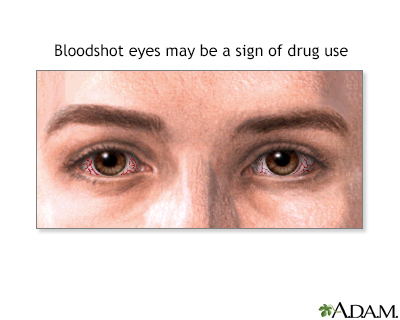The New “S Talk”
As part of this year’s Mental Illness Awareness Week, UF Health Psychiatry hopes to make room for a new “S talk” in the classrooms of Alachua County Public…

Update your location to show providers, locations, and services closest to you.
As a parent, it is natural to worry about your teenager. And, like many parents, you may be afraid that your teen may try drugs, or worse, become dependent on drugs.
While you cannot control everything your teen does, you can take steps to help your child stay away from drugs. Start by learning all you can about drugs and drug use. Learn the signs of drug use so that you can be alert. Then use these tips to help prevent drug use in your teen.
Teenagers and drugs; Symptoms of drug use in teenagers; Drug abuse - teenagers; Substance abuse - teenagers
First, learn about the different types of drugs that may be used. Older teens are more likely to use drugs than younger teens. Marijuana (pot) is still common. More and more teens are using prescription drugs.
WHY TEENS USE DRUGS
There are many reasons why teens might use drugs. Some common reasons include:
TALKING WITH YOUR TEEN ABOUT DRUGS
It is not easy, but it is important to talk with your teen about drugs. It is one of the best ways to prevent teen drug use. Here are some tips:
HELP PREVENT DRUG USE
While there is no surefire way to make sure your teen never does drugs, you can take the following steps to help prevent it.
KNOW THE SIGNS
There are many physical and behavioral signs that point to drug use. Learn them and be aware if your teen acts or looks different. The signs include:
You may notice changes in your teen's energy level, such as:
You also may notice changes in your teen's behavior:
HOW TO GET HELP
If you think your teen is using drugs, start by talking with your family health care provider. Your provider can help treat your teen, or can refer you to a drug specialist or treatment center. You can also look for resources in your community or local hospitals. Look for a specialist who has experience working with teenagers.
Do not hesitate, get help right away. The sooner you get help, the less likely your teen's drug use will turn into drug abuse.
You can find more information at teens.drugabuse.gov.

Breuner CC. Substance abuse. In: Kliegman RM, St. Geme JW, Blum NJ, Shah SS, Tasker RC, Wilson KM, eds. Nelson Textbook of Pediatrics. 21st ed. Philadelphia, PA: Elsevier; 2020:chap 140.
National Institute on Drug Abuse for Teens website. Parents: facts on teen drug use. teens.drugabuse.gov/parents. Accessed November 1, 2021.
Partnership to End Addiction website. Parent e-books & guides. drugfree.org/parent-e-books-guides/. Updated June 2020. Accessed November 1, 2021.
Our community and patient programs provide great value to patients, families and loved ones. People can find support, educational materials, expert consultants and more. In most instances, these programs are offered free of charge.
Provides peer support and therapeutic intervention to troubled students and enhances leadership skills for teen leaders.
As part of this year’s Mental Illness Awareness Week, UF Health Psychiatry hopes to make room for a new “S talk” in the classrooms of Alachua County Public…
